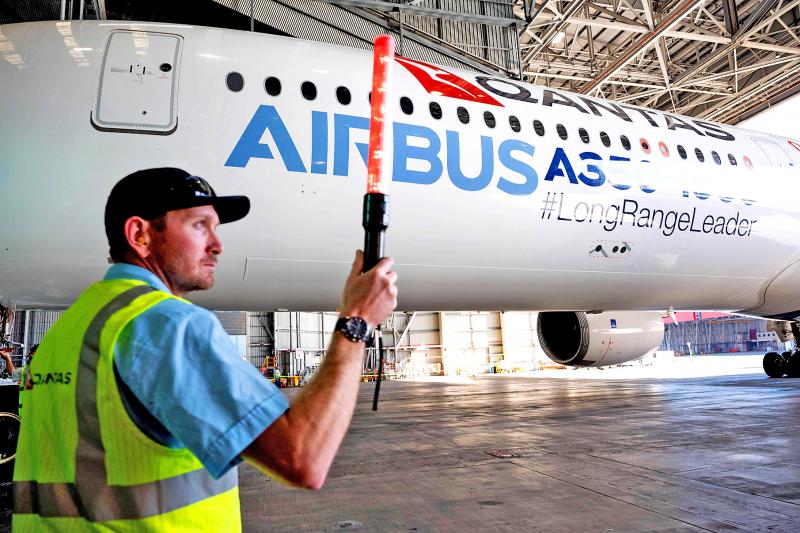Qantas Airways Ltd revived a plan to start direct flights connecting Australia’s east coast with New York and London, as it finally ordered Airbus SE jets for the ultra-long services.
The airline yesterday said that it is buying 12 A350-1000s that can fly non-stop from Australia to any city in the world, adding that commercial services are to start from Sydney in late 2025.
Qantas had planned to start the 20-hour flights — internally called Project Sunrise — next year, and was close to ordering the aircraft when COVID-19 decimated the aviation industry.

Photo: AFP
The resumption of the project signals the airline’s confidence in an international passenger rebound, as well as greater demand for flights with no stopovers.
Qantas said that demand on key routes to London, Los Angeles and Johannesburg already exceeds pre-pandemic levels.
“We’re finally seeing a sustained recovery in travel demand,” Qantas CEO Alan Joyce said.
Qantas’ A350s will be configured to carry 238 passengers in four classes — first, business, premium economy and economy. Most A350s carry more than 300 passengers. The planes are designed with an extra fuel tank to extend their range so they can fly the distances required.
In a post-pandemic world in which geopolitical tensions are also likely to increase, the ultra-long services should have a unique appeal as they bypass travel hubs, University of Sydney business professor Rico Merkert said, adding that flights will command higher fares and be more profitable for Qantas.
Qantas said the plane’s economy seats will have five more centimeters of legroom, although first-class cabins will come with a seat, a bed and a door.
More than 40 percent of the cabin is designed with premium seating, compared with about 30 percent in Qantas’ Boeing 787s and Airbus A380s. The new planes have “a wellbeing zone” in the middle where passengers can stretch or take a break.
The A350s are to be delivered to Qantas from 2025 until 2028.
A rebound in business air travel has been steeper than expected, demand from small businesses is above pre-COVID-19 levels and corporate travel is 85 percent recovered, Qantas said.
In the current quarter, Qantas’ domestic capacity is expected to be 105 percent of 2019 levels, with international capacity to be slightly less than 50 percent in the same period, rising to about 70 percent in the quarter starting July, it said.
Qantas also confirmed a domestic fleet order, announced in December, for 40 A321XLRs and A220 aircraft, as well as options for 94 more jets during at least a decade. Those aircraft are to replace the airline’s aging Boeing 737s and 717s.

GROWING OWINGS: While Luxembourg and China swapped the top three spots, the US continued to be the largest exposure for Taiwan for the 41st consecutive quarter The US remained the largest debtor nation to Taiwan’s banking sector for the 41st consecutive quarter at the end of September, after local banks’ exposure to the US market rose more than 2 percent from three months earlier, the central bank said. Exposure to the US increased to US$198.896 billion, up US$4.026 billion, or 2.07 percent, from US$194.87 billion in the previous quarter, data released by the central bank showed on Friday. Of the increase, about US$1.4 billion came from banks’ investments in securitized products and interbank loans in the US, while another US$2.6 billion stemmed from trust assets, including mutual funds,

Micron Memory Taiwan Co (台灣美光), a subsidiary of US memorychip maker Micron Technology Inc, has been granted a NT$4.7 billion (US$149.5 million) subsidy under the Ministry of Economic Affairs A+ Corporate Innovation and R&D Enhancement program, the ministry said yesterday. The US memorychip maker’s program aims to back the development of high-performance and high-bandwidth memory chips with a total budget of NT$11.75 billion, the ministry said. Aside from the government funding, Micron is to inject the remaining investment of NT$7.06 billion as the company applied to participate the government’s Global Innovation Partnership Program to deepen technology cooperation, a ministry official told the

AI TALENT: No financial details were released about the deal, in which top Groq executives, including its CEO, would join Nvidia to help advance the technology Nvidia Corp has agreed to a licensing deal with artificial intelligence (AI) start-up Groq, furthering its investments in companies connected to the AI boom and gaining the right to add a new type of technology to its products. The world’s largest publicly traded company has paid for the right to use Groq’s technology and is to integrate its chip design into future products. Some of the start-up’s executives are leaving to join Nvidia to help with that effort, the companies said. Groq would continue as an independent company with a new chief executive, it said on Wednesday in a post on its Web

Taiwan Semiconductor Manufacturing Co (TSMC, 台積電), the world’s leading advanced chipmaker, officially began volume production of its 2-nanometer chips in the fourth quarter of this year, according to a recent update on the company’s Web site. The low-key announcement confirms that TSMC, the go-to chipmaker for artificial intelligence (AI) hardware providers Nvidia Corp and iPhone maker Apple Inc, met its original roadmap for the next-generation technology. Production is currently centered at Fab 22 in Kaohsiung, utilizing the company’s first-generation nanosheet transistor technology. The new architecture achieves “full-node strides in performance and power consumption,” TSMC said. The company described the 2nm process as